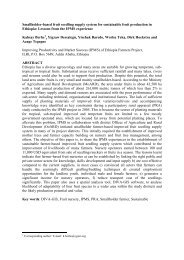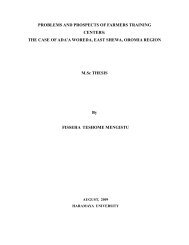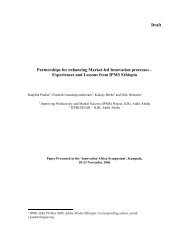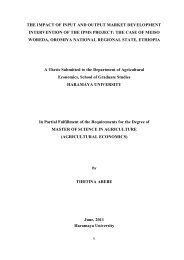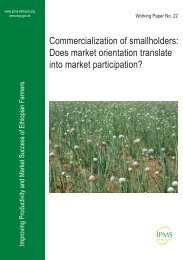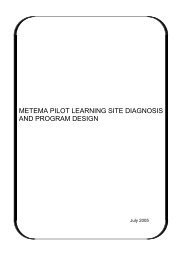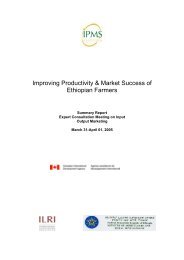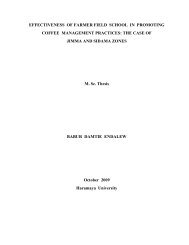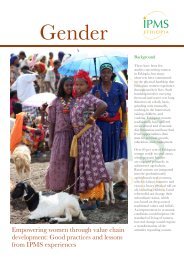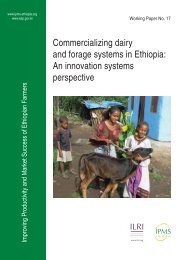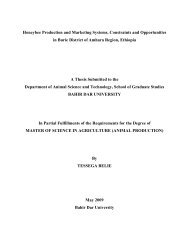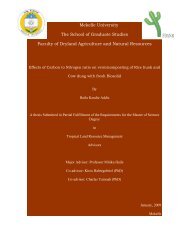2.7.1. Types <strong>of</strong> linkage mechanismsJoint planning and review process, collabor<strong>at</strong>ive <strong>of</strong> pr<strong>of</strong>essional activities, resource alloc<strong>at</strong>ionprocedures and communic<strong>at</strong>ion device are types <strong>of</strong> linkage mechanisms. Innov<strong>at</strong>iondeveloped without the involvement <strong>of</strong> farmer has little chance to achieve the actual needs <strong>of</strong><strong>farmers</strong>. Since, 1980s onwards rural development program, <strong>farmers</strong> particip<strong>at</strong>ory research,particip<strong>at</strong>ory learning action, particip<strong>at</strong>ory technology development, particip<strong>at</strong>ory ruralappraisal, rapid rural appraisal and recently client oriented research, farmer research groups,farmer field school and farmer extension group are used (BoARD and SWHISA, 2006).Institutional linkage between FTCs, <strong>farmers</strong> or groups and different institutions in agriculturalsector including rural micro-finance credit institutions, cooper<strong>at</strong>ives, research centers, healthclinics, schools, priv<strong>at</strong>e traders, and entrepreneurs can contribute to give technical, financialand institutional assistances. Institutions have important roles for farming communities. Theydeliver rules and regul<strong>at</strong>ions th<strong>at</strong> can understand the cultural set up <strong>of</strong> people and strengthencommunity-based organiz<strong>at</strong>ions. Institutions can have roles in quality control, pollutionregul<strong>at</strong>ion, influence human behavior, reduce risk and uncertainty by establishing stablestructure and build resilience to shocks th<strong>at</strong> minimize transaction costs and addressingexternalities (Ellis, 1999).2.7.2. Roles <strong>of</strong> actors and stakeholdersActor is a role th<strong>at</strong> a system in the environment plays during an interaction with in our system(David, 2002). Actors are all those people who have a stake or share in a particular issue orsystem. Actors can be <strong>at</strong> any level or position in a society from the intern<strong>at</strong>ional to then<strong>at</strong>ional, regional, household or intra-household level. Actors include all those who affect andare affected by policies, decisions or actions within a particular system (Eshetu, 2008).Stakeholder is a person, group, organiz<strong>at</strong>ion, or a system th<strong>at</strong> affects or can be affected by anorganiz<strong>at</strong>ional action (Cameron et al., 2003). Stakeholder is a person who holds the stake orstakes in a bet. It is any group or individual, who can affect, or it is affected by, the22
achievement <strong>of</strong> a corpor<strong>at</strong>ion purpose (Ramirez, 2001). Stakeholders are persons or groupswho are directly or indirectly affected by a project as well as those who may have interests ina project and/or the ability to influence its outcome either positively or neg<strong>at</strong>ively. These mayinclude individuals, communities, formal and informal represent<strong>at</strong>ives, authorities, politicians,religious leaders, civil society organiz<strong>at</strong>ions and others.2.7.3. Knowledge and inform<strong>at</strong>ion sharingKnowledge is defined as the combin<strong>at</strong>ion <strong>of</strong> d<strong>at</strong>a and inform<strong>at</strong>ion to which is added expertopinion, skills and experiences (Ermias, 2006). Knowledge sharing is the process <strong>of</strong> anactivity through which knowledge (i.e. inform<strong>at</strong>ion, skill or experience) is exchanged amongpeople, friends or members <strong>of</strong> a family, a community or an organiz<strong>at</strong>ion. Knowledge sharingactivities are supported by knowledge management systems. If knowledge is not shared,neg<strong>at</strong>ive consequences such as isol<strong>at</strong>ion and resistance to ideas occur (Gruber, 1993). Thereare four knowledge types:Embrained knowledge: It is Conceptual skills and cognitive abilities. It is also practical andhigh level type <strong>of</strong> knowledge. The second type <strong>of</strong> knowledge is Embodied knowledge. It isan action oriented and consists <strong>of</strong> contextual practices, social acquisitions and non explicittype <strong>of</strong> knowledge. The third type <strong>of</strong> knowledge is Encultured knowledge. It is the process <strong>of</strong>achieving shared understandings through socializ<strong>at</strong>ion and accultur<strong>at</strong>ion. The fourthknowledge type is Encoded knowledge. Inform<strong>at</strong>ion is conveyed in signs and symbols andde-contextualized into codes <strong>of</strong> practice. It deals more with transmission, storage andintegr<strong>at</strong>ion <strong>of</strong> knowledge. Knowledge can be transfer from one part to another part(s) <strong>of</strong> anindividual or organiz<strong>at</strong>ion.Inform<strong>at</strong>ion sharing: inform<strong>at</strong>ion is fact or understood d<strong>at</strong>a while knowledge is flexible andadaptable skills, a person’s unique ability to apply it. Knowledge is tacit and personal, theknowledge one person has difficulty to quantify, store, and retrieve for someone else to use.Specifically, for knowledge to be made explicit, it must be transl<strong>at</strong>ed into inform<strong>at</strong>ion.Hence, inform<strong>at</strong>ion sharing referred to one-to-one exchange <strong>of</strong> d<strong>at</strong>a between a sender and23
- Page 1 and 2: EFFECTIVENESS OF MODULAR TRAINING A
- Page 3 and 4: SCHOOL OF GRADUATE STUDIESHARAMAYA
- Page 5 and 6: STATEMENT OF AUTHORFirst of all, I
- Page 7 and 8: ABBREVIATIONS (Continued)RAAKSSGSWH
- Page 9 and 10: ACKNOWLEDGMENTFirst and foremost le
- Page 11 and 12: TABLE OF CONTENTS (continued)2.5. E
- Page 13 and 14: LIST OF TABLESTablepageTable 1. Est
- Page 15 and 16: LIST OF TABLES IN THE APPENDIXAppen
- Page 17 and 18: 1. INTRODUCTION1.1. Background of t
- Page 19 and 20: since 2004 in Ethiopia. Farmers wer
- Page 21 and 22: undertaken. If institutions focused
- Page 23 and 24: panel discussion, conference, exper
- Page 25 and 26: 2. LITERATURE REVIEWIn this chapter
- Page 27 and 28: Figure1. Four Stages of the TIER Mo
- Page 29 and 30: Level 1: Reactions: At this level,
- Page 31 and 32: In 1963, agricultural extension was
- Page 33 and 34: stated objectives which involves co
- Page 35 and 36: trainees’ farm cooperation and co
- Page 37: Modular training was supposed to gi
- Page 41 and 42: e examined, defined and described b
- Page 43 and 44: FTCs are expected to play active ro
- Page 45 and 46: deficient in training skills, espec
- Page 47 and 48: 3. RESEARCH METHODOLOGYIn this chap
- Page 49 and 50: Figure 4. Map of the study Area (Fo
- Page 51 and 52: 3.2.2. Sample size and sampling pro
- Page 53 and 54: 3.2.3. Types and sources of dataTo
- Page 55 and 56: 3.2.5. Method of data analysisBased
- Page 57 and 58: Table 4: Profiles of respondentsNo
- Page 59 and 60: The data in the Table reveal that t
- Page 61 and 62: 4.1.3.3. Delivery of modular traini
- Page 63 and 64: also have not participated with ful
- Page 65 and 66: Table 8: Knowledge test of sample h
- Page 67 and 68: 4.2.2. PracticePractice was operati
- Page 69 and 70: The responses of farmers were categ
- Page 71 and 72: system. Actors’ interactions can
- Page 73 and 74: FTCs and this project supports only
- Page 75 and 76: 4.3.5. Actor linkage matrixActor li
- Page 77 and 78: According to actor linkage matrix;
- Page 79 and 80: followed by projects, NGOs and rese
- Page 81 and 82: may have access for information abo
- Page 83 and 84: 4.5.3. Lessons learned from better
- Page 85 and 86: SWOT AnalysisStrength, Weakness, Op
- Page 87 and 88: Opportunities• Participatory plan
- Page 89 and 90:
Practice was assessed based on trai
- Page 91 and 92:
with communication media, articles,
- Page 93 and 94:
BoARD and SWHISA (Bureau of Agricul
- Page 95 and 96:
IPMS (Improving Productivity and Ma
- Page 97 and 98:
Taddesse Mulugeta, 2007. Rural wate
- Page 99 and 100:
Appendix Table 1. Category of train
- Page 101 and 102:
Appendix Table 5: Extent of linkage
- Page 103 and 104:
3.2. What do you think about the ti
- Page 105 and 106:
4.5 Practice (Indicate whether you



